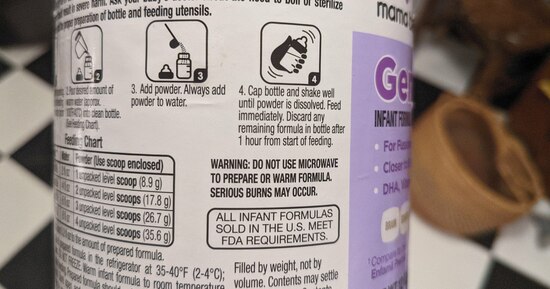Stop Discouraging Microwave Formula Preparation |
September 1st, 2022 |
| kids, milk |
FDA:
Never use a microwave oven for heating infant formulas. Microwaving may cause the bottle to remain cool while hot spots develop in the formula. Overheated formula can cause serious burns to your baby.CDC:
If you do decide to warm the bottle, never use a microwave. Microwaves heat milk and food unevenly, resulting in "hot spots" that can burn your baby's mouth and throat.
NHS:
Never warm up formula in a microwave, as it may heat the feed unevenly and burn your baby's mouth.
Australia's Department of Health and Aged Care:
Do not use a microwave to heat up formula as this can make the milk too hot and can burn baby's mouth.
The baby formula label:
Warning: do not use microwave to prepare or warm formula. Serious burns may occur.
This is all nuts, and they should stop. The microwave is great way to heat the water for making formula because it's fast and efficient. Instead of telling people never to do this we should be giving the small amount of guidance necessary to do it safely. Ideally the guidelines for preparing infant formula using the microwave would look something like:
Heat the water, taking care not to overheat. A 6oz bottle in a typical microwave requires approximately 15 seconds to warm from room temperature, or 30 seconds from the fridge. Add the powder, cap the bottle, and shake thoroughly. Test a drop on the back of your hand: it should not feel hot or even very warm.
As long as you're heating the water before adding formula you can't get hot spots, because you still have to shake after adding the powder. And testing on your hand ensures it's not too hot.
Microwaving mixed formula or breast milk is probably also fine, but there is at least a little more reason to worry there: if you get it too hot you'll likely lose some of the nutritional value. Exactly how hot it has to get before this is a problem isn't something we know, though what studies there are indicate gentle heating is fine (Fay 1991, Sigman-Grant 1992, Ovesen 1996, Sierra 2001).
I wish public health authorities would cite their sources and give background. It needn't be in the primary public-facing documentation, but each claim ("never use a microwave") should have a link to their reasoning. I think in this case if they needed to explain their reasoning it would be clear that it doesn't hold up, and they should change their recommendations.
(I've written about this before, but only in the context of breast milk. I think the case is strongest for heating water for formula because there's no question of nutritional degradation.)
Comment via: facebook, lesswrong, substack
